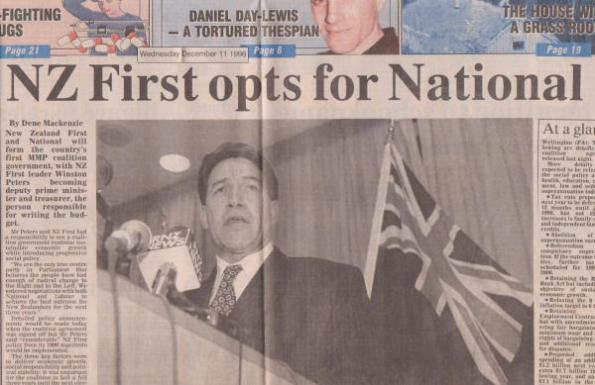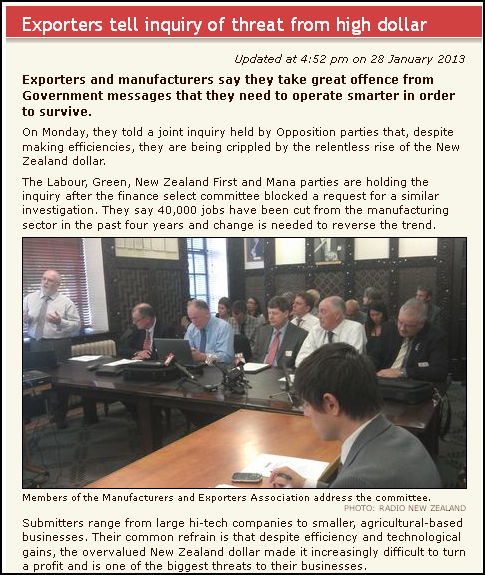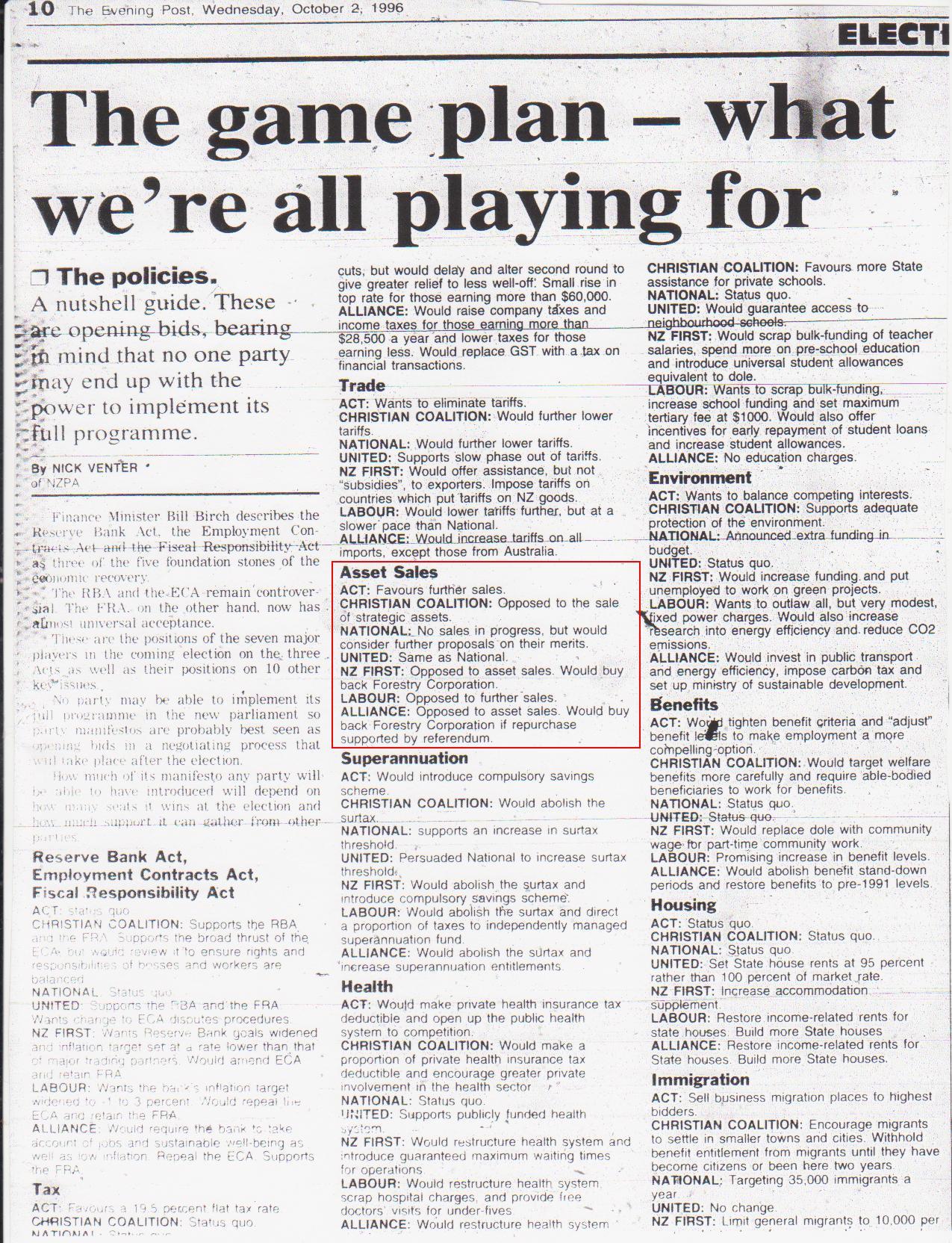.

.
Continued from: The Politics of Power and a Very Clear Choice – Part Toru
.
First NZ
.
As Chris Trotter pointed out in his excellent blogpost just recently,
“ONLY STEVEN JOYCE could offer up JB Were, Woodward Partners, Milford Asset Management, First NZ Capital, and Forsyth Barr as credible critics of the Labour-Greens’ energy policy. As if these six financial institutions were ever likely to offer the Opposition parties their fulsome support!.”
Acknowledgement: The Daily Blog – No Dog In The Fight: Whatever happened To Academic Expertise?
We can add to the above list; AMP Capital, Morningstar Research, BusinessNZ, and Federated Farmers – all of which appear to be the front-line foot-mercenary-soldiers in National’s counter-attack to the Labour-Green’s NZ Power.
Minister of the Known Universe, Steven Joyce’s actual comment was,
“Financial analysts including JB Were, Woodward Partners, Milford Asset Management, First NZ Capital, Devon Funds Management and Forsyth Barr are unanimous in their condemnation. One has labelled it a ‘hand grenade’ to the New Zealand economy, while others have said it will cut the value of every New Zealanders’ KiwiSaver account and lead to rolling blackouts. ”
Acknowledgement: Scoop – Labour-Greens Power ‘Plan’ Economic Sabotage
“Rolling blackouts“?!
He left out a plague of locusts and rivers turning into blood (though with farm run-offs, these days it’s more like Rivers of Excrement).
We’ve had power black-outs in the past, due to dry weather; equipment failure; shut-downs for maintenance; human error; etc. And we will continue to have unavoidable power cuts, in the future;
.
Acknowledgement: NZ Radio – Damaging gales forecast for north
.
Joyce added,
“Kiwis are deeply suspicious about the Labour-Greens announcement and its timing. It’s simply economic sabotage. ”
Hmmm, considering the high value of the New Zealand dollar’s destructive effects on our manufacturing/export sector and the 40,000 jobs that’s been lost in the last four years – if I were Joyce, I would not be too keen to bandy about charges of “economic sabotage”. National’s policies in the last few years have been more than effective in that regard,
.
Acknowledgement: Radio NZ – Exporters tell inquiry of threat from high dollar
.
It’s hardly surprising that most of the negative response has been from the financial markets and commercial firms. They are the ones with the naked vested interests.
To date, the following fear-threats have been thrown at the New Zealand public – because make no mistake, these doomsday scenarios are directed at voters, and not Labour or the Greens.
Acknowledgement: First NZ – Contact Energy – If it ain’t broke don’t fix it
Hold on.
Is First NZ is really telling the public that power prices have only risen 2.6% since 2000?!?! Well, they do qualify that with “net of line charges and after allowing for inflation”. Though why they would omit line charges seems pointless; the public are still paying at the end. “Clipping the ticket” seems the norm and impacts on the end-consumer regardless of how it is done.
Which also raises a question in my mind; why is First NZ making this assertion only now? Why did they not make the effort to rebut National’s claims when Dear Leader issued public statements like this, on 27 January, 2011,
“In the nine years Labour was in government, power prices went up 72 per cent and the Government owned 100 per cent of the assets.”
Acknowledgement: NZ Herald – Power price fears if Govt stakes go
Why did First NZ not issue public statements ‘correcting’ National’s “misrepresentations” at the time?
Why have they left it only till now, to counter the assertion that “power prices went up 72%”?
Why is a single-buyer desk for electricity sending brokerage firms into a panic? Especially, considering, that we already have single buyer-desk’s in the form of Fonterra, Zespri, PHARMAC, etc.
The answer, I submit, is fairly obvious. First NZ’s fanciful statements and assertions are part of an orchestrated litany of bullshit to scare Joe & Jane Public to run back into the cold, dead arms of Nanny Neoliberal.
The Financial Money Men, with their Federated Farmers allies, are propping up their neo-liberal stooges in Parliament. The rats are out of the woodwork, and we can see who is lined up against the best interests of the public.
Because, in the final analysis, this all boils down to money – who makes it and who gets to keep it. And because so much money is at stake, we are told that rising power bills is the price for living in a “free” market.
We’re also promised that power prices will drop. Sometime. In the future.
We just have to be patient.
Maybe another thirty years?
It will be interesting if people buy into this propaganda BS. Will voters believe the fear-mongering campaign from the money-pushers?
Or will they realise that share brokers and merchant bankers are interested only in seeing that power prices remain at stratospheric levels, to provide maximum returns for their shareholders?
Because one thing is as certain as the sun rising tomorrow; these firms are not remotely interested in our welfare. Nor in the welfare of Kiwi families being gouged with higher and higher power bills.
I’m struck senseless that so many National supporters believe that siding with the likes of JB Were, Woodward Partners, Milford Asset Management, First NZ Capital, Devon Funds Management, Forsyth Barr, Business NZ, Federated Farmers, et al, will somehow gain them some kind of ‘benefit’. Are National supporters so masochistic and blinded by their faith in the “free market” that they are willing to tolerate paying higher and higher prices for electricity?
I hope they realise that JB Were, Woodward Partners, Milford Asset Management, First NZ Capital, Devon Funds Management, Forsyth Barr, Business NZ, Federated Farmers, et al, will not pay the power bills for National supporters.
Good luck with that!
The Labour-Green coalition should welcome these attacks as an opportunity. Every time one of these money-pushing firms launches a critical attack on NZ Power – the Labour-Greens should counter with press conferences where facts, stats, and more details are presented for the public and nice, big, colourful graphic-charts presented.
Like this one, from the Ministry of Economic Development/Business, Innovation, and Employment;
.

Acknowledgement: Ministry of Economic Development/Business, Innovation, and Employment – Power Prices
.
(Note price drop around 1999. Whilst Industrial and Commercial prices fell, residential prices continued to rise. There is more to explain the 1998/99 price fall here; Statistic NZ – Electricity consumption. It had little to do with Bradford’s reforms, and more to do with competing retailers changing their methods of calculation for the CPI electricity price index and building extra generation capacity. The cost of the latter had shifted from the State and onto domestic consumers.)
Where possible, David Parker and Russell Norman should speak at engagements around the country at public meetings. (Community newspapers and other local media should be engaged, as they love anything that happens within their community.)
Invite others such as the Salvation Army, and experts such as energy-sector expert, Molly Melhuish, and Victoria University researcher Geoff Bertram, should be invited to address media events.
Invite members of the public; families, etc, to present their power bills as evidence of skyrocketing prices.
Build a Broad Front of support. Show the country that there is support for NZ Power.
People want reassurance. We need to give it to them. And we need to show them why the National and the finance sector are working in cahoots.
Because ain’t it funny that no community organisation has come out, demanding that the electricity sector remain unregulated and welcoming higher and higher prices?
And if the media aren’t presenting the full story, use progressive blogs to publish the information. We, too, can be “foot soldiers” in this struggle. (Because surprise, surprise, we too, use electricity.)
This is a war between the Neo Liberal Establishment and Progressive forces fighting to roll back thirty years of a failed experiment.
That war began on 18 April.
There is no reason on Earth why we should not win.
.
NZ First
.
I find it hard to trust NZ First. Or, to be more precise; I find it hard to trust it’s leader, Winston Peters.
His parliamentary colleagues; party members; and supporters – I have no problem with. They are people who, generally, want the best for this country and dislike the false religion of neo-liberalism as deeply as those on the Left do.
But Peters…
Peters has ‘form’. He has changed direction on numerous occassions, and I find it hard to take him at his word.
Some examples…
1.
In 1996, Winston Peters campaigned to defeat the National Government and remove it from power. His campaign statements at that time seemed unequivocal;
“Jim Anderton: Is the member going into a coalition with National?
Winston Peters: Oh no we are not.” – Parliamentary Hansards, P14147, 20 August 1996
.
“There is only one party that can beat National in this election that that is New Zealand First.” – Winston Peters, 69 & 85 minutes into First Holmes Leaders Debate, TVNZ, 10 September 1996
.
“Of course I am not keen on National. Who is?
… This is a government bereft of economic and social performance [so] that they are now arguing for stability.” – Winston Peters, Evening Post, 25 June 1996
.
“The prospects are that National will not win this election, that they will not form part of any post-election coalition.” – Winston Peters, The Dominion, 5 October 1996
.
“It is clear that this National government will use every means at its disposal to secure power… Come October 12… Two months ago I warned that the National Party would use every trick and device at their command to to retain their Treasury seats.” – Winston Peters speech to Invercargill Grey Power, 26 August 1996
.
“The Prime Minister [Jim Bolger] is not fit for the job and come 12 October he will be out. He should not get on his phone and call me like he did last time, because we are not interested in political, quisling behaviour. We are not into State treachery.” – Winston Peters, Parliamentary Hansards, P14146, 20 August 1996
.
“We believe the kind of politician depicted by Bolger, Birch, and Shipley is not to be promoted into Cabinet. As a consequence we will not have any truck with these three people.” – Winston Peters, NZ Herald, 22 July 1996
.
“We are a party that says what we mean and mean what we say, regardless of the political consequences.” – Winston Peters, Speech to public meeting, 9 October 1996
Despite Peters’ assurances, on 11 December 1996 the public woke up to this nightmare,
.

.
2.
In 1996, one of the biggest election issues was the sale of Forestry Corporation of New Zealand Ltd (cutting rights only, not the land). In 1996, the then Bolger-led National government had announced it’s intention to privatise the SOE,
In 1996, the Minister of Finance announced the government’s intention to sell its shares in the Forestry Corporation of New Zealand (formerly Timberlands Bay of Plenty). The corporation’s assets were Crown Forestry Licences to planted forests, which had expanded to 188 000 ha in the central region of North Island, processing plants in various locations, a nursery and a seed orchard.
A handful of large forestry companies and consortia submitted bids. The sole criterion was price. However, as the strength of the bids was not as great as hoped, bidders were asked to resubmit their bids. In August 1996, it was announced that the Forestry Corporation of New Zealand had been sold to a consortium led by Fletcher Challenge in a deal that valued the assets at $NZ 2 026 million.
Acknowledgement: Devolving forest ownership through privatization in New Zealand
The sale went ahead and the final sale-price was $1,600,000, to a consortium made up of Fletcher Challenge Forests (37.5%), Brierley Investments Ltd (25%) and Citifor Inc (37.5%).
Acknowledgement: Treasury – Income from State Asset Sales as at 30 September 1999
Throughout 1996, Winston Peters engaged in an election campaign to “hand back the cheque” should he and his Party be elected into a position of power,
.
Acknowledgement: (hard copy only): Evening Post, 13 August 1996
.
Acknowledgement: (hard copy only): Evening Post, 2 October 1996
.
To quote Peters, who said on 13 August 1996,
“I ask both the Labour and Alliance parties – putting politics aside for this one day – to join New Zealand First in it’s post-election pledge to reverse the sales process“.
As many who lived through the times will recall, Peters pledged to “hand back the cheque”. It was a powerful message.
But it never happened.
Peters joined in coalition with National (consigning Labour and The Alliance into Opposition) and the pledge to buy back the forests was dropped – much to the disgust of people at the time..
Sixteen years later, and Peters has made the same promise all over again. On TV3’s The Nation, on 24 June 2012, Winston Peters stated,
“The market needs to know that Winston Peters and a future government is going to take back those assets. By that I mean pay no greater price than their first offering price. This is, if they transfer to seven or eight people, it doesn’t matter, we’ll pay the first price or less. ”
Acknowledgement: TV 3 – The Nation
On 4 March this year (2013), Peters announced,
“New Zealand First will use its influence on the next coalition Government to buy back our state-owned power companies which are being flogged off by National and we are committed to buying back the shares at no greater price than paid by the first purchaser.”
Acknowledgement: Scoop – One More Quisling Moment from Key
Another quote from Winston Peters, who said in a speech to the NZ First Conference, in 1999,
“All the policies and manifestos in the world are meaningless when you cannot trust the leadership. That is what leadership is about – trust. Nobody expects leadership to be infallible. But you have a right to expect it to be trustworthy.”
Acknowledgement: (hard copy only): Speech by Rt Hon Winston Peters to the New Zealand First Conference, 18 July 1999, at the Eden Park Conference Centre
Indeed; “All the policies and manifestos in the world are meaningless when you cannot trust the leadership.”
If Peters and NZ First hold the balance of power in 2014 and choose to enter into a coalition arrangement with National – will he carry out his pledge this time?
Or will that promise be dropped and buried for political expediency and some babbled, weak excuse?
It’s happened once, before. And not too long ago.
Can he be trusted for a second time?
I am of the belief that folks can learn from their mistakes. God knows I’m made a few in my early adulthood.
Has Winston Peters learned to honour his electoral pledges and not to treat the voting public as fools? Has he learned that he betrays voters at his peril? I hope so.
Because the public exacted a fitting response to his behaviour in 2008, as he and his Party were punished and spent three years in the political wilderness (see; New Zealand general election, 2008).
More than ever, the future of this country – and the power – is in our hands,
.
.
.
Don’t screw up this time, Mr Peters.
.
*
.
Previous Related Blogposts
History Lesson – Tahi – Electricity Sector “reforms” (4 March 2012)
John Key: Man of Many Principles (28 Sept 2012)
Labour, Greens, NZ First, & Mana – A Bright Idea with electricity! (10 March 2013)
Additional Sources
Statistics New Zealand: The history of electricity reform
Ministry of Economic Development: Electricity Prices
NZ History Online: Dancing Cossacks political TV ad
The Treasury: Income from State Asset Sales as at 30 September 1999
References
NZPA: Splitting up ECNZ expected to cut wholesale power price (16 Dec 1998)
NZPA: Reforms aimed at business – Luxton (21 April 1999)
Otago Daily Times: Power Prices Set To Soar (12 May 1999)
Otago Daily Times: No case for regulation (24 May 1999)
Otago Daily Times: Lower power prices coming says Bradford (3 June 1999)
Otago Daily Times: Power prices to rise by up to 15.1% (29 June 1999)
Otago Daily Times: Reforms blamed for hike (13 July 1999)
Scoop: Alliance to hold Winston Peters accountable (8 Oct 1999)
NZ Herald: Peters ‘forgets’ NZ First support for power reforms (13 Aug 2008)
Fairfax: Government to seek inquiry into power price rise (30 September 2008)
NZ Herald: Put prices on hold, Brownlee tells power companies (21 May 2009)
NZ Herald: Mighty River directors’ 73pc pay rise realistic – Key (5 April 2013)
Scoop: Labour-Greens to rip up the book on electricity pricing (18 April 2013)
NZ Herald: Labour-Greens plan could work, says Vector CEO (19 April 2013)
NZ Herald: National gobsmacked at Labour idea (19 April 2013)
NZ Herald: Power plan likened to Soviet era (19 April 2013)
NZ Herald: MRP chief slams socialist’ plan (21 April 2013)
TVNZ: Q+A – Transcript of Steven Joyce interview (21 April 2013)
NZ Herald: Bernard Hickey: Power barons fail to fool the public this time around (21 April 2013)
Radio NZ: Power prices nearly double since 2000 (21 April 2013)
Other blogs
Kiwiblog: Electricity Prices
Tumeke: MANA threaten overseas investors not to buy assets – Bloomberg pick up on the story
.
.
= fs =












First NZ Capital are extremely influential in NZ capital markets. “Elephant in the room?!”. Also, in wealth management.
See: http://www.icij.org/offshore (remember the Cook Island’s anyone?)
Anyone else noticed that there may be crossover to a CHC based company, Murray & Co.? Compare each entities Board.
Liquidity or Solvency problem’s (or, both) at some point in time for Murray & Co.?
These organisations are strongly incentivised to expound the dangers of regulation versus unfettered capital markets. A little like the NRA in America – do you think Wayne LaPierre is going to back down from the NRA assertion that to ensure the safety of your child, teachers should be armed?
Not surprising that the finance capitalists and petty bourgeois coupon clippers line up against state regulation. This is an historic bloc formed when NZ was settled between finance, commerce and farming. NZ is an extractive colony whose comparative advantage is ripping raw materials out for export and the result is that everyone competes to extract part of the rent received. NZ capitalism is based on a weak compliant comprador bourgeoisie acting as agents of one or other imperialist powers from GB to US to today, China.
The dream of NZ workers was always to escape wage labour into self-employment . The bulk of the working class only established its relative independence from the compradors under Labour’s economic insulation policies between 1935 and 1975. The incentive to be self-employed was removed.
When Labour pulled the plug on insulation in 1984 the economic base of organised labour went down the drain. Calling this neo-liberalism masks the more fundamental cause of what was a global attack on organised labour to restore falling profits and revive world economy.
The aftermath is that the relative decline of Labour has once more forced workers to try to escape from the working class into self-employment (sold by the NACTs and Blairites, as self-reliance, independence, and economic ‘freedom’.)
This makes them ripe for the load of bullshit selling them a piece of the ‘property owning democracy’ which pits the small investor against the rest of the working class. It also explains why NZ First can never extract itself from the temptation to suck up to the compradors for a sniff of the rent.
We can see then how even the hint of a return to regulation with NZPower raises the ghost of ‘economic nationalism’ and with it limits imposed on the comprador’s rip, shit and bust strategy of rent seeking at the expense of the big majority of NZ who are reliant on a wage.
Fortunately for most of us, this is not a ghost but a pre-condition for human survival and the comprador parasites know it. That explains the unleashing of the abuse campaign to bullshit ordinary people into starving, freezing and dying too be ‘free’. It’s only a matter of time before the majority rises up against the parasites and takes control of its own fate.
Comments are closed.